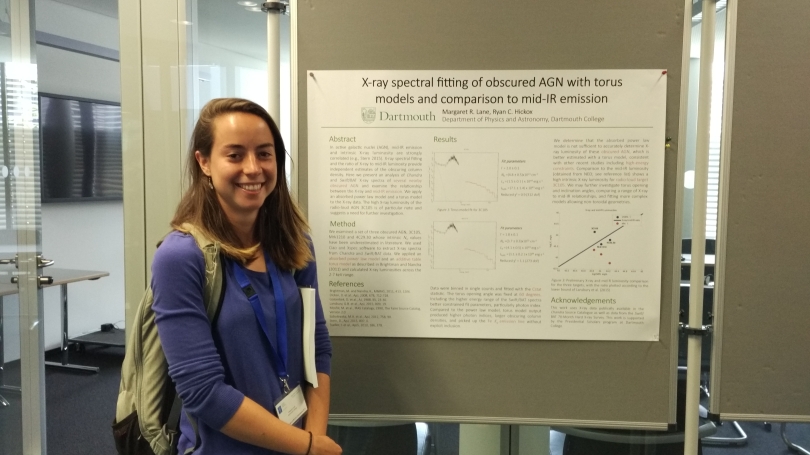
- Public Policy
- Leadership
- Funding
- News & Events
- About the Center
Back to Top Nav
Back to Top Nav
Back to Top Nav
Back to Top Nav
Earlier this summer I attended and presented a poster at an astronomy conference. The conference was hosted at the European Southern Observatory headquarters in Garching, Germany from June 26th to July 1st. This was my first experience participating in a scientific conference; I’m grateful for the opportunity and feel that I can apply what I learned to my work and to my plans for the future. In particular, I appreciated the chance to deepen my understanding of the broad picture of AGN research across different, more specific areas of study. I was also was impressed by the spirit of collaboration evident throughout the conference and the openness to asking difficult and often unanswered questions.
The conference was structured as a series of talks divided into different subgroups of research categories – mostly research in different areas of the electromagnetic spectrum. The work that I have done at Dartmouth with Professor Hickox falls primarily into the X-ray category. Thus it was very valuable for me to get the opportunity to hear a variety talks on research quite unrelated to my own narrow focus. I got a better idea of the broad picture of the field as a whole, which is key when considering implications and meaning beyond the abstractness of a single data set.
In addition, it was clear throughout that all of the scientists placed an emphasis on collaboration rather than competition. Networking and sharing ideas was evidently a priority. The point of a talk wasn’t to simply show off the speaker’s knowledge, rather, to demonstrate an advance in knowledge and then invite discussion, critique, and suggestions on how to proceed with a particular project. Often, the speakers would bring up a specific point during the conclusion of a talk and invite feedback or later discussion. I was interested to see scientists who are very knowledgeable within their field being so open about gaps that still exist in that knowledge – which is of course how the science can move forward. I received a question about my poster that made me question the assumptions I have been making with a particular model.
Indeed, I was also struck by the number of questions that were asked that didn’t have clear-cut answers. As an undergraduate, my science education thus far has primarily relearning concepts that have been confirmed over decades and centuries of past study. Yet that is not how the cutting edge of science really works – the most exciting work takes place where you use what you’ve learned to make a dent in the huge amount of things you still don’t know. It was a very cool experience to see “science in action” as the speakers and conference participants discussed new results that have implications for changing some of the paradigms of the field.
I have posted photos of the event online. I also have shared the experience of the conference within my Dartmouth research group to the rest of the group members who did not attend, including preparing and presenting a short summary of a talk that I found particularly relevant and interesting. I am working on setting up a website and will include a short summary of the experience at the conference there as well.
Margaret Lane '17, Rockefeller Mini-Grant Recipient
The Rockefeller Center's Mini-Grants program funds registration fees for students attending conferences, as well as the costs of bringing guest speakers to Dartmouth. The views and opinions expressed here are the author’s own and do not necessarily represent the views and opinions of the Rockefeller Center or constitute an endorsement by the Center.